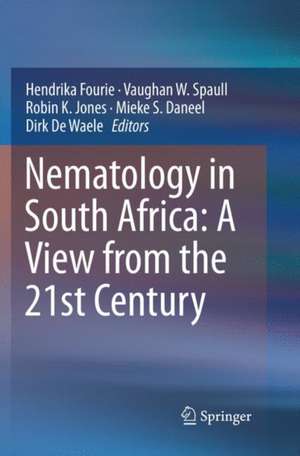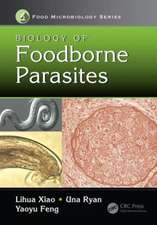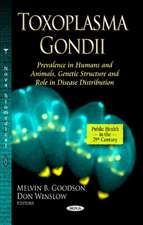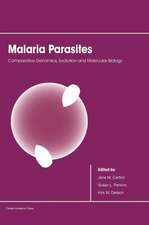Nematology in South Africa: A View from the 21st Century
Editat de Hendrika Fourie, Vaughan W. Spaull, Robin K. Jones, Mieke S. Daneel, Dirk De Waeleen Limba Engleză Paperback – 20 iul 2018
| Toate formatele și edițiile | Preț | Express |
|---|---|---|
| Paperback (1) | 1210.01 lei 38-44 zile | |
| Springer International Publishing – 20 iul 2018 | 1210.01 lei 38-44 zile | |
| Hardback (1) | 1175.73 lei 38-44 zile | |
| Springer International Publishing – 7 mar 2017 | 1175.73 lei 38-44 zile |
Preț: 1210.01 lei
Preț vechi: 1592.12 lei
-24% Nou
Puncte Express: 1815
Preț estimativ în valută:
231.56€ • 240.38$ • 193.09£
231.56€ • 240.38$ • 193.09£
Carte tipărită la comandă
Livrare economică 18-24 martie
Preluare comenzi: 021 569.72.76
Specificații
ISBN-13: 9783319830117
ISBN-10: 3319830112
Pagini: 569
Ilustrații: XIX, 569 p. 145 illus., 117 illus. in color.
Dimensiuni: 155 x 235 mm
Ediția:Softcover reprint of the original 1st ed. 2017
Editura: Springer International Publishing
Colecția Springer
Locul publicării:Cham, Switzerland
ISBN-10: 3319830112
Pagini: 569
Ilustrații: XIX, 569 p. 145 illus., 117 illus. in color.
Dimensiuni: 155 x 235 mm
Ediția:Softcover reprint of the original 1st ed. 2017
Editura: Springer International Publishing
Colecția Springer
Locul publicării:Cham, Switzerland
Cuprins
The History of Nematology in Southern Africa.- Nematode morphology and classification.- Techniques and methods.- Quarantine nematodes.- Chemical and biological control.- Alternative nematode management strategies for subsistence farmers.- Nematode pests of cereal crops.- Nematodes of leguminous and oil seed crops.- Nematodes of potato and other vegetable crops.- Nematode pests of sugarcane.- Nematode pests of industrial crops.- Nematode pests of citrus.- Nematode pests of grapevine.- Nematode pests of deciduous fruits.- Nematode pests of banana.- Nematode pests of miscellaneous tropical and subtropical crops.- Nematode pests of pineapples.- Nematode pests of grasses and weeds.- Free-living nematodes.- Overview of the South African plant-parasitic nematode survey (SAPPNS).- Entomopathogenic nematodes.- Marine and estuarine nematodes.- Nematode parasites of primates and humans.- Future challenges.
Notă biografică
Hendrika Fourie’s nematology career started in 1991 at the Grain Crops Institute of the then Department of Agriculture. She obtained her MSc and PhD qualifications thereafter at the North-West University and University of Leuven, respectively. She conducts fundamental and practically-applied research, focusing on the development of nematode management strategies for various food crops, and trains postgraduate students. She enjoys running and travelling across the globe!
Vaughan Spaull was awarded his PhD in nematology from the University of Reading in England, in 1973. Prior to that he was employed as nematologist in the South Orkney Islands with the British Antarctic Survey. Later he worked as a biologist on Aldabra atoll with the Royal Society. Thereafter he joined the South African Sugarcane Research Institute at Mount Edgecombe, where for 32 years his primary interest was the management of plant parasitic nematodes. He is now retired.
Robin Jones was awarded hisPhD in 1976 from London University. He moved to the Citrus and Subtropical Research Institute in Nelspruit where he worked on the nematode problems of bananas. In 1980, he returned to the UK and worked as an abstractor for CABI. In 1981, he returned to South Africa working in the Crop Protection Industry dealing with the development and marketing of nematicides. In 2006, he started a consulting and analytical services business, is an active Rotarian and enjoys cycling
Mieke Daneel was awarded her PhD at the Rand Afrikaans University in 1989 after which she started working at Agricultural Research Council - Institute for Tropical and Subtropical Crops (originally Department of Agriculture). She is still at the same institute based in Mbombela. The research of Mieke and her team is focused on alternative control strategies for nematodes in bananas, subtropical crops and vegetables.
Dirk De Waele received MSc degrees in Zoology and International Co-operation Development,and a PhD degree in Nematology (1983; University of Gent). He worked at the Grain Crops Institute in Potchefstroom (South Africa) from 1984-1989 and thereafter as a senior scientist at Plant Genetic Systems (Belgium) and science advisor for the Minister-president of Flanders. In 1994 he joined the Laboratory of Tropical Crop Improvement (University of Leuven) and focused on the development of low-input nematode management strategies and the effect of arbuscular mycorrhizal fungi on plant-parasitic nematodes.
Vaughan Spaull was awarded his PhD in nematology from the University of Reading in England, in 1973. Prior to that he was employed as nematologist in the South Orkney Islands with the British Antarctic Survey. Later he worked as a biologist on Aldabra atoll with the Royal Society. Thereafter he joined the South African Sugarcane Research Institute at Mount Edgecombe, where for 32 years his primary interest was the management of plant parasitic nematodes. He is now retired.
Robin Jones was awarded hisPhD in 1976 from London University. He moved to the Citrus and Subtropical Research Institute in Nelspruit where he worked on the nematode problems of bananas. In 1980, he returned to the UK and worked as an abstractor for CABI. In 1981, he returned to South Africa working in the Crop Protection Industry dealing with the development and marketing of nematicides. In 2006, he started a consulting and analytical services business, is an active Rotarian and enjoys cycling
Mieke Daneel was awarded her PhD at the Rand Afrikaans University in 1989 after which she started working at Agricultural Research Council - Institute for Tropical and Subtropical Crops (originally Department of Agriculture). She is still at the same institute based in Mbombela. The research of Mieke and her team is focused on alternative control strategies for nematodes in bananas, subtropical crops and vegetables.
Dirk De Waele received MSc degrees in Zoology and International Co-operation Development,and a PhD degree in Nematology (1983; University of Gent). He worked at the Grain Crops Institute in Potchefstroom (South Africa) from 1984-1989 and thereafter as a senior scientist at Plant Genetic Systems (Belgium) and science advisor for the Minister-president of Flanders. In 1994 he joined the Laboratory of Tropical Crop Improvement (University of Leuven) and focused on the development of low-input nematode management strategies and the effect of arbuscular mycorrhizal fungi on plant-parasitic nematodes.
Textul de pe ultima copertă
This unique book contains not only a comprehensive up-to-date summary of the achievements made in all areas of Nematology in South Africa over more than half a century, but it also combines this rather technical part with an insiders narrative of how Nematology started and developed. It also demonstrates how the South African community of nematologists gradually adapted to major changes in agriculture. These were due to a major political shift followed by socio-economic changes and this in an often challenging natural environment. At the same time this book is conceived as a useful source for young scientists to provide them with practical knowledge and critical insight in the field of Nematology. The information given is based primarily on research conducted by nematologists in South Africa. Most of this research was aimed at finding workable solutions for nematological problems confronted by both large-scale commercial producers and smallholding farmers. During a period when funding for scientific research is becoming increasingly scarce, the future demand and quest for practical solutions by applied research will only increase.
Caracteristici
The book covers a wide range of nematological topics in a variety of (agro-)ecosystems that usually can only be found in specific detailed information sources written for specialists The book focuses primarily on plant-parasitic nematode pests that can cause substantial, even devastating damage and consequential yield losses in a range of agri- and horticultural crops grown by both large-scale commercial and small-scale subsistence farmers in a wide range of agroecosystems The book is written for scientists as well as students and extension staff since it is practice-based and –driven







